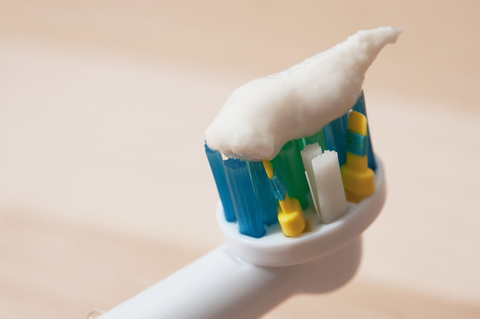April 25th, 2023

Temporomandibular joint disorders (TMD) describe a set of conditions that involve trouble with your jaw and face muscles. They result from a problem in the temporomandibular joint (TMJ), which is a hinge that connects the temporal bones, in your skull in front of each ear, to your jaw. The joint enables you to talk, yawn, and chew by letting your mouth move.
TMD can be very painful and interfere with functions such as eating and speaking. This what to watch for and how to try to prevent TMD.
Risk Factors for TMD
You are at higher risk for TMD if you are a women than if you are male. The disorder is most common among adults between the ages of 20 and 40 years. Other risk factors for TMJ disorders include the following.
- Arthritis in the area, making movement more difficult
- Excessive tooth grinding, because it increases stress on the joint
- General stress, which can lead you to clench your teeth and strain facial muscles
Symptoms of TMD
Symptoms of TMD can last for just a short while, or for several years. Seeing Dr. Brekke is important if your symptoms make it impossible for you to eat regularly or if you have unbearable pain or discomfort. The following symptoms can occur on both or one side of your face.
- Aching or very tired facial muscles
- Jaws that are fixed open or shut without you being able to unlock them
- Grating or popping sounds when you chew or close or open your mouth
- Pain in the entire area, including the mouth, jaw, neck, or shoulders, that comes on when you chew or yawn
Preventing TMD
You can try to prevent TMD by focusing on reducing risk factors. If you grind your teeth at night, ask Dr. Brekke about wearing a mouthguard. If you are overly stressed, look into ways to better manage your stress and relax your muscles. Another strategy for trying to prevent the development of TMD is to avoid chewing gum, since that puts stress on your jaw.
If you have questions about TMD, don’t hesitate to contact our Hillsboro office.
April 5th, 2023

The Importance of Facial Protection
Americans from all walks of life should mark April as National Facial Protection Month on their calendars. The American Association of Pediatric Dentistry, Academy for Sports Dentistry, American Academy of Pediatric Dentistry, and American Association of Oral and Maxillofacial Surgeons have combined forces to sponsor this annual campaign, which aims to educate and remind us of the importance of protecting our face and teeth against impacts and injuries.
Wearing a helmet can save your life and prevent devastating physical damage in a variety of situations, from playing football to riding a bicycle. According to the American Association of Oral and Maxillofacial Surgeons, helmets reduce the risk of various head injuries by as much as 85 percent. Whether helmet laws apply in your area or not, Dr. Brekke and our team at Brekke & Sayre Orthodontics want you to make sure you and your loved ones wear helmets with the appropriate safety ratings for specific activities. (A sticker on or inside the helmet will usually indicate this rating.) Helmets can also help save your teeth if they come with an attached faceguard, an essential addition for football players and others involved in contact sports.
Preventing Dental Injuries
A mouthguard can protect you against a variety of dental injuries, such as cracked, broken, or knocked-out teeth. The American Dental Association states that mouthguards play an essential role in preventing up to 200,000 dental injuries each year, and many states mandate their use for sports activities such as football and hockey. The Academy for Sports Dentistry warns, however, that these mouthguards must be custom-fitted as precisely as possible to prove effective. Have a professional-quality mouthguard molded and fitted by our team at Brekke & Sayre Orthodontics for better protection than a generic store-bought or “boil-and-bite” variety can offer. These cheaper versions tend to wear out quickly, interfere with proper breathing, and provide uneven degrees of cushion against impacts. Always have a fresh mouthguard fitted for each new sports season.
Choose the right combination of helmet, faceguard, and mouthguard to protect your teeth and face this April, and tell your friends to do the same! To learn more about mouthguards, or to schedule an appointment with Dr. Brekke, please give us a call at our convenient Hillsboro office!
March 29th, 2023

Our team at Brekke & Sayre Orthodontics knows that there are many ways you can protect your pearly whites throughout your orthodontic treatment. If you follow the rules and brush your teeth twice a day, floss often, and protect your appliances from damage, you should have a successful treatment.
But did you know there’s another way to keep your teeth sparkling and healthy during your time wearing braces?
Fluoride, the mineral that helps you prevent cavities and tooth decay, can also help keep your teeth strong. Fluoride comes in two varieties: topical and systemic. Depending on your oral health or the recommendation of Dr. Brekke, you may be required to have a fluoride treatment every three, six, or 12 months. We may also prescribe a fluoride product such as a mouthwash, gel, or antibacterial rinse for at-home treatment to keep your teeth happy in between visits.
If you have any other questions about fluoride or your treatment, please don’t hesitate to give us a call!
March 22nd, 2023

We hear this question a lot at Brekke & Sayre Orthodontics, and we don’t mind when patients who are eager to complete their orthodontic treatment ask us. After all, we know there is no better feeling than getting your braces off!
During your initial consultation with Dr. Brekke, we will map out a specific treatment for you and will try our hardest to give you a timeline of when we expect you to wrap up treatment.
Having said that, we know every patient is different. People have different biological responses to orthodontic treatment and some people’s teeth may move faster than others.
Luckily, there are things you can do to ensure your treatment wraps up in a timely manner. By following these suggestions, you can avoid any setbacks during your treatment.
- Make sure to keep your adjustment appointments. Postponing or cancelling will delay treatment!
- Be sure to show up on time to your appointments. This will give Dr. Brekke and our team time to do everything we planned during your adjustment visit.
- When prescribed, make sure you are diligent about wearing rubber bands or other appliances.
- Avoid damage to your braces and teeth by wearing a mouth guard during sports activities.
- Make sure to brush and floss regularly! Gum disease or other dental work can delay orthodontic treatment.
If you remember to follow these guidelines, you’ll be on your way to having the dazzling, healthy smile you’ve always wanted. As for us, our team at Brekke & Sayre Orthodontics will do our part to move your orthodontic treatment along efficiently. If you have any questions about your treatment time, please give us a call at our Hillsboro office or ask us during your next visit!





